Table of Contents

As a public service to those hunting for the elusive Kiwi white supremacists, here, courtesy of the New York City Department of Education, are 14 things to watch out for if you suspect you (or a friend) are a white supremacist…
Quote.PERFECTIONISM — Giving undue focus to the shortcomings in someone or their work, or viewing them as personal flaws. “Making a mistake is confused with being a mistake, doing wrong with being wrong,” according to a description of the book on the Web site for the “Challenging White Supremacy Workshop.”End quote.
SENSE OF URGENCY — Prioritizing short-term results without considering long-term implications. “For example, sacrificing interests of communities of color in order to win victories for white people,” the write-up says.
What about sacrificing the interests of Taranaki communities in order to win victories for Green people?
Quote.DEFENSIVENESS — When people, often in power, are dismissive of new ideas solely for fear that they might shake things up. “The defensiveness of people in power creates an oppressive culture,” the description says.End quote.
QUANTITY OVER QUALITY — Being results-oriented and diminishing an otherwise-sound process if it doesn’t produce measurable results. It also goes hand-in-hand with “discomfort with emotion and feelings.”
KiwiBuild, anyone?
Quote.WORSHIP OF THE WRITTEN WORD — This idea prioritizes documentation and writing skills, rather than the “ability to relate to others.” It also leads to teaching that there is “only one right way” to do something.End quote.
ONLY ONE RIGHT WAY – (see above, but no further explanatory text for this one, make it up as you go along.)
PATERNALISM — When those already in power think they’re the only ones who can or should make decisions. “Those with power often don’t think it is important or necessary to understand the viewpoint or experience of those for whom they are making decisions,” the write-up explains.
Would that be Ardern deciding what we can do and see on the Internet or Golriz deciding what we can or cannot say? Captain’s calls?
Quote.EITHER/OR THINKING — Seeing things in terms of good or bad, right or wrong, or black or white. This “results in trying to simplify complex things, for example believing that poverty is simply a result of lack of education.”End quote.
Is that like, if you disagree with me you are racist?
Quote.POWER HOARDING — Similar to defensiveness, those in power seek to preserve it, and see it as something that can’t be shared. They may also feel threatened when someone suggests change, and “assume they have the best interests of the organization at heart.”End quote.
FEAR OF OPEN CONFLICT — This comes through when someone overemphasizes politeness, and equates broaching touchy topics with being rude. “The response is to blame the person for raising the issue rather than to look at the issue which is actually causing the problem,” the description says.
INDIVIDUALISM — This idea is found among people who have “little experience or comfort working as part of a team.” It can lead to isolation, and emphasize competition over cooperation.
PROGRESS IS BIGGER, MORE — Focusing only on the bottom line and tangible growth. “Progress is an organization which expands … or develops the ability to serve more people,” those with this mindset think.
OBJECTIVITY — This can lead to the belief that there is an ultimate truth and that alternative viewpoints or emotions are bad. It’s even inherent in “the belief that there is such a thing as being objective.”
RIGHT TO COMFORT – Those in power may believe that they “have a right to emotional and psychological comfort,” while denying the same to those not in power. This also covers cries of reverse racism because that’s “equating individual acts of unfairness against white people with systemic racism which daily targets people of color.”









